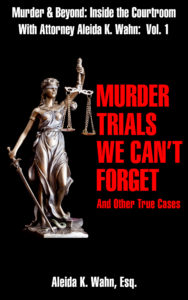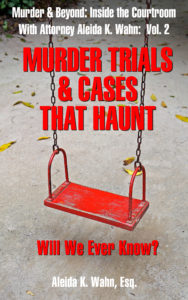
“You left a trail of destruction and broken hearts behind you when you killed your husband,” declared Judge Blaine Bowman as he looked down at Julie Elizabeth Harper and denied her request to strike a gun enhancement, which would have reduced her prison sentence by 25 years. It had been two years and nine months since Julie Harper had sat before Judge Bowman awaiting her fate for fatally shooting her husband in 2012 in their Carlsbad home while their three children watched cartoons downstairs. The children were eight, six, and one at the time. Through two trials, Harper maintained she was the victim of verbal and sexual abuse by her 6-foot, 7-inch husband, and only shot him accidentally while defending herself from a sexual attack during a violent argument after she revealed to him for the very first time she had filed for divorce. Prosecutors argued her story was all a lie and she killed him intentionally out of “anger, bitterness and spite.” The single bullet struck Jason Harper’s left side and entered his heart, killing him within seconds. Both Jason and Julie were 39 years old at the time.
Julie Harper’s Two Trials and Sentencing
On October 1, 2014, after a two-week trial, a jury acquitted Harper of first-degree murder but hung on all the lesser charges, voting 9-3 in favor of not guilty of second-degree murder and 7-5 in favor of manslaughter. A second jury was not so conflicted and found Harper guilty of second-degree murder on October 8, 2015. Wrenching testimony was offered by the Harper’s two young children, innocent souls who had been enforced to endure more pain than they could bear. To read an account of Harper’s second trial, please read my stories at: https://aleidalaw.com/crime/
At her sentencing in January of 2016, Harper’s lengthy plea for mercy went to no avail, and Judge Bowman sentenced her to 40-years-to-life, which included the additional mandatory sentence of 25-years-to-life for the personal use of a firearm causing death. Harper went on to appeal, but it was denied. However, the appellate court found she was eligible for resentencing under a new law that went into effect January 1, 2018. Under Senate Bill 620, a judge is now given the discretion to strike or dismiss a gun enhancement when the interests of justice would be so served.[1] On October 24, 2018, Julie Harper once again begged Judge Bowman for mercy, asking him to strike the gun enhancement, leaving her with a sentence of 15-years-to-life for her second-degree murder conviction. After an emotional hearing, where both sides described the unending pain the shooting has caused, proving there are no winners in this case, Judge Bowman upheld Harper’s initial sentence. She would spend 40-years-to-life in prison.
Heartbreaking Letters From the Harper Children
Before announcing his decision, Judge Bowman heard from all sides. First to speak was Lina Harper, Jason’s mother, who with a full head of white hair and using a cane, slowly made her way to the witness table. She seemed older than her 77 years as she began by telling Judge Bowman next Tuesday would be Jason’s 46th birthday, that he should have lived another 40 years, but he was murdered on August 7, 2012. Opposing any reduction to Harper’s sentence she said, “Jason should have easily lived to be in his 80s, but a gun was used to rob him of his life. In no way should his killer be free any sooner than the number of years she took from him.” She said the three children, who have resided with her and her husband for the past five years, are still recovering from the horrific trauma Harper caused. They do not want Harper to know anything about their lives and don’t want any reminder of her she stated.
To prove this point further, Keith Watanabe, the prosecutor for both trials stood and read aloud three letters written by the children. Despite their tender years, Jake and Jackie had been called upon to testify at the trials, breaking everyone’s hearts they were placed in such a tragic position. At least these children would not be pulled out of school this day but could speak this time through the written word. Jake, now 15, said he has lived five years with his grandparents and feels safe. He thinks his mother should serve the full 40 years. Jackie, now 12, who proclaimed at Harper’s sentencing she would never again call her mother, but would instead forever refer to her only as “Julie,” wrote she will always be known as “the daughter of a murderer,” when she really is so much more. She said she never wants to see Harper again, will never forgive her, and she “broke my own heart.” She wants her to stay in prison as long as possible. Josh, now seven, who was only one at the time of the shooting, said his mother “does not seem nice” because of how Jackie reacts when her name is mentioned.
Watanabe next turned to the law, saying under Penal Code section 1385, there is a long list of criteria the court may look to. Watanabe pointed to the fact Jason was killed when the children were home, Harper never called 911, but instead embarked on an entire day of “lies and deception,” including disposing of the gun which has never been found. He said the shooting was a surprise attack and from behind, and there would be no murder without the gun. He asked Judge Bowman to look at the impact on the victim’s family. He closed by saying Jake and Jackie knew both parents and that Jason was a good, honorable man, yet Harper portrayed him as a rapist.
Pleas For Mercy
It was now time to hear from Harper’s father, John Cihak. A gentle man who provided unwavering support to his daughter from day one, told the court his entire family acknowledges the tragedy of Jason’s death, recognizes the great suffering of Jason’s family, and knows the emotional damage done to the three children. He said, “Julie has remorse.” He then said, “I ask the court to show my daughter mercy.” He continued by describing the additional sentence for use of a gun as too long for a person who lashed out in “a chaotic way,” and Julie now understands her addiction to prescription medication. “It was a grievous mistake,” but “Julie is not depraved” he stated. He said the 25 years is excessive and the State of California recognizes it too by showing the courts should not be bound by rigid rules. He closed by again asking for mercy.
Julie Harper dressed in a gray prison sweatshirt, looking worn, no longer with the polished platinum hair of her court testimony days spoke next. She said the most important thing in the world was being a mother and the children were the center of her universe even when her marriage was falling apart. She cries every day and prays they will forgive her. She has “eternal remorse” and the pain is “almost unbearable.” She revealed she was recently overwhelmed by despair of news her only sister had shot and killed herself, leaving her body to be found by their father. Upon this testimony, Harper’s father’s emotions overflowed, and his face and neck turned bright red. His suffering was clearly unbearable too. Harper said her mother died without her being by her side and she has “lost everything important to me.”
In prison, Harper has worked on rehabilitating herself, which she was doing long before the new law was enacted she emphasized. She works full-time and has completed a long list of classes. Her counselor said she has accomplished more in two years than most people do in four years.
In turning to the shooting, Harper said in her marriage, she had lost so much of who she was. Her failing marriage exacerbated her fragile health, and with the steroids she had to take, created a “perfect storm.” She believes if you took away one of those stressors, the shooting would never have happened. Harper said she has gained insight and come full circle to the woman she was when she first met Jason. Her remorse has deepened with the understanding of how expansive the damage has been. She now takes responsibility and asks for “hope and mercy.” “Your honor, please have mercy. I plead you give me hope” she closed.
Gloria Collins, Harper’s newly retained attorney, rose to argue for her client. She began by saying she was a deputy district attorney for 25 years, and this was the longest sentence she has seen for the killing of one person. Now with this new law, an appropriate sentence could be fashioned for each crime. She said Jason’s death occurred during a disintegrating marriage, the stress of caring for three young children, Harper’s physical problems of debilitating arthritis, and the side effects of all the prescription medications she was taking. The Derringer weapon was “notoriously unsafe” Collins pronounced and then emphasized only one shot had been fired. She said there was no premeditation or planning and Harper’s actions after the shooting were just frantic behavior from the fear and pain of the awful thing that had just happened. She pointed to the fact Harper had no prior record, and her prison behavior had been exemplary.
In closing, Collins argued Harper’s situation should not warrant such a long sentence, and the district attorney agreed with this view because they offered a voluntary manslaughter after the first trial. She asked the court to strike the enhancement, saying if Julie had beaten her husband with a bat or stabbed him, she would have only received an additional year.
Judge Bowman’s Decision
At last, it was Judge Bowman’s time to speak. He began by saying he had given “a great deal of thought” to this case. He noted Harper’s behavior in prison was “extraordinary,” but the only issue was whether the interests of justice would be served by striking the enhancement. He said the court can consider all circumstances, and he knows the case well, as he sat through two trials and heard both children testify. The facts are “fairly egregious” he said. Jason was killed when the kids were home and when the children ran upstairs to find out what happened, the cover-up began. Harper didn’t know the extent of her husband’s injury, but never called 911. She disposed of the gun, leaving it to never be found. “You left a trial of destruction and broken hearts behind you when you killed your husband,” he said, before praising Lina and Homer as “saints” for raising the three children at their age. He also found Harper’s father to be a victim too. John Cihak was a wonderful grandfather and because of Harper’s actions, he now has no contact with the children, which has broken his heart he stated.
Judge Bowman said the one factor he would give great weight was the use of the gun. “The court believes that Jason Harper would still be alive today without the introduction of a gun in this case.” The gun is very impersonal, you just pull the trigger and it is final, irreversible, which is why the legislature imposes such stringent punishment. Judge Bowman found the interests of justice would not be furthered by striking the gun enhancement and the sentence of 40-years-to-life would stand. He closed by saying, “It gives me no joy to render this sentence.”
The Press Conference
At the press conference immediately following the hearing, attorney Watanabe said Harper has now been sentenced twice to 40-years-to-life. The case is finally over. He said Harper will serve 85% of her 40-year sentence before being considered for parole, a timeframe of 30 years. Julie Harper will be 85-years-old.
To See Video Coverage of the Hearing, Please Go To: https://www.nbclosangeles.com/news/california/Julie-Harper-Carlsbad-Husband-Murder-Resentence-SB-620-498433291.html
[1] Senate Bill 620 is codified in Penal Code Section 12022.53(h) which provides: “The court may, in the interest of justice pursuant to Section 1385 and at the time of sentencing, strike, or dismiss an enhancement otherwise required to be imposed by this section. The authority provided by this subdivision applies to any resentencing that may occur pursuant to any other law.”
About Aleida K. Wahn, Esq.


I am an attorney, award-winning true crime writer, and legal analyst of criminal cases. I cover criminal trials and write stories and books about compelling, gripping, and unforgettable cases that impact our world. I take you into the courtroom in high-profile murder trials, rape cases, crimes of passion, cases involving mental illness, deviant behavior, and more. I have a deep passion for true crime, criminal law, and all aspects of the criminal justice system. I have appeared as an expert on true crime shows, including “48 Hours,” “Snapped,” and “The Dead Files,” and provided legal analysis on high-profile criminal trials on Court TV, the Law & Crime Trial Network, Fox 5 News, ABC 10 News, and KUSI News. I also create and host shows with the Del Mar Television Producers Group, addressing criminal justice and social issues in recent criminal trials.
I provided my insight and legal analysis on Court TV and the Law & Crime Trial Network of the high-profile trial of former NFL star Kellen Winslow Jr. It was a trial that captured the nation as the heralded ex-football star with fame, fortune, and a famous name stood accused of multiple rapes and other sex crimes involving five women. As the trial delved into shocking facts, complicated legal issues, and unexpected twists and turns, I was there for every minute. After the trial, I wrote a book on the case, going behind the headlines to share the extraordinary details of what happened inside the courtroom. Judging Winslow Jr.: From NFL Star to Serial Rapist? Inside the Shocking Rape Trial of Kellen Boswell Winslow II is now available on Amazon.
I am passionate about telling true crime stories, as these penetrating stories have the power to move us all, while highlighting societal issues which need to be addressed. I have personally seen the human devastation which is present in each trial and believe there is a lesson to be learned in every single case. It is through awareness and examining critical issues society can effect change and even make new laws. To learn more, please visit: https://www.aleidalaw.com.
Read about the gripping and unforgettable trials that I have covered in my latest books:



